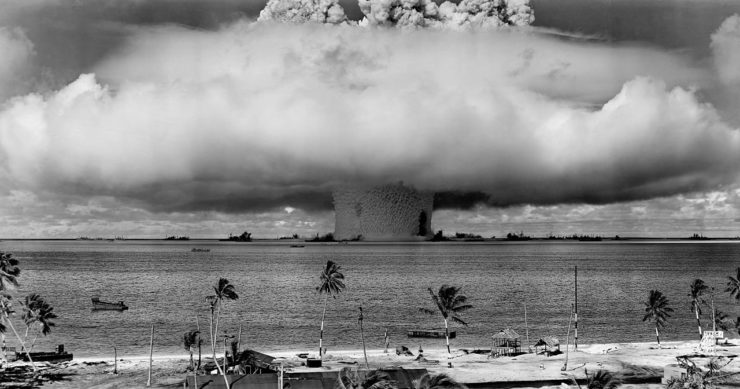If there is one astonishing fact about the 20th century that will bewilder historians of the future, it is that the nations of the world, the United States of America and Russia in particular, invested trillions of dollars in nuclear weapons without putting them to serious use against the other. Yes, the United States did batter Nevada into submission with approximately a thousand nuclear detonations. Presumably the Russians did something analogous to their own subject territories. And yet, the long promised global thermonuclear war has never quite come to pass.
Nor is this weird sense of potential going unfulfilled peculiar to writers struggling to come up with enough words for a Tor.com essay! Game company Fria Ligan knows this market; it has just released the 4th edition of the venerable Twilight 2000 tabletop roleplaying game (newly out today), which offers players the chance to escape to a world in which international tensions spiraled into nuclear conflict in the mid-1990s. Forget work deadlines, forget tax forms, forget worriedly checking the Covid numbers in your area! It’s much more fun to spend your time searching for a trove of faintly glowing food tins so that your character doesn’t starve before the fallout kills them.
Perhaps it’s no wonder, then, that science fiction and thriller authors have been more than willing to provide us with the dubious wonders that could be ours, given only the resolve to press The Button . Consider these five Cold War works.
Shadow on the Hearth by Judith Merril (1950)
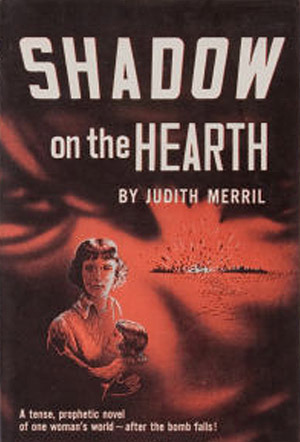
On a seemingly unremarkable mid-century day, Gladys kisses her work-bound husband Jon goodbye and struggles to manage her Westchester household without her dutiful maid Veda. Conventional domesticity comes to an abrupt, unpleasant halt when an unnamed enemy detonates nuclear devices in major American cities, including the New York City where Jon works. Official broadcasts assure Americans that the crisis is well in hand, that US defenses are now utterly impenetrable, and that victory over the unnamed enemy is certain. All people like Gladys need to do is obey the government and trust that a better day will soon come.
Official optimism is little comfort to Gladys. The rudimentary communications of the day have been shattered by the attack, as have commercial supply chains. Gladys is left to care for her children with no idea when Jon will return—if he was not incinerated along with so many New Yorkers. She won’t know whether fallout will reach Westchester, whether food will be available for her and her children, or even if the sunny proclamations from the government are accurate or merely bare-faced lies.
She has a household to keep alive—a challenge from which she does not flinch.
Dark December by Alfred Coppel (1960)
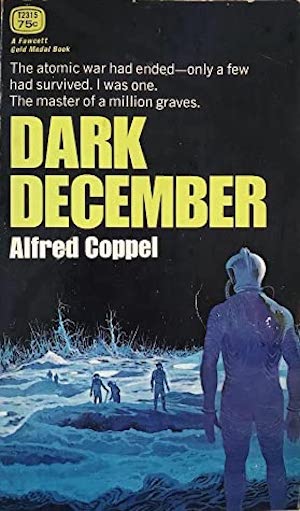
Major Kenneth Gavin did his bit in World War Three, sending missile after missile towards the Soviets from the Unimak Island Titan missile base. Somehow, Soviet counter-strikes failed to obliterate Unimak (nearby Dutch Harbor was not so lucky). The United States having prevailed over Russia, Gavin is released from military service to return to San Francisco, where his wife Sue and daughter Pam wait. Or so he hopes.
That’s IF Gavin can find his way to Klamath Falls, purchase a horse and cross the radioactive wasteland between Gavin and whatever remains of San Francisco. IF Sue and Pam are even still alive (news no longer trickles out of lost zones like the US West Coast). IF Gavin can elude the deranged Collingwood, who blames Gavin for the end of Collingwood’s career. IF Gavin can survive in a violent world, even if he is so sickened by violence that he refuses to defend himself when attacked.
Pulling Through by Dean Ing (1983)
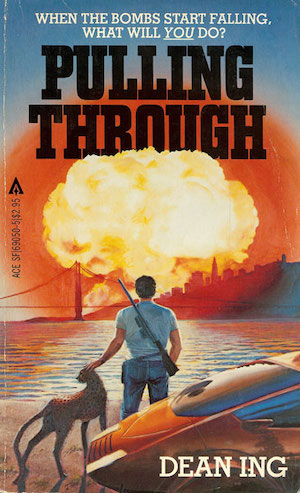
Bounty hunter Harve Rackman is prudent and prepared. Thus, when he learns that Soviet-built Syrian fighter-bombers have nuked US forces in the Mediterranean, he does not wait to see if the situation will escalate into a full-scale exchange before fleeing the Bay Area. He doesn’t have to worry about having a safe destination: his Contra Costa County shelter awaits!
Having survived the first exchange, a new challenge arises. Harve’s sister Shar and her family never arrived at Harve’s shelter. Prudence dictates that Harve wait until the radioactivity dies down. Family loyalty compels him to head out into the chaos in the slender hope that Shar, her husband, and her children are still alive, that he can find them and somehow—despite fallout, panicked refugees, and blocked roads—bring them back to his shelter.
(The Ace edition of this book comes with a How To guide for building survival gear out of simple household materials.)
The Third World War: August 1985 by General Sir John Hackett (1978)

Fearing that the nations of the Warsaw Pact are slipping out of Soviet control, the USSR does what anyone would do in their position and launches an invasion of West Germany. After all, there is nothing like a joint external enemy to unify a troubled alliance. Swift victory over NATO will ensure unity amongst the Soviet Union’s rebellious allies. At least, that’s the theory.
The reality is that NATO foresaw the coming war and was prepared. Red conventional forces cannot deliver victory over NATO. Indeed, those forces may not be sufficient to forestall defeat or to prevent unhappy Warsaw Pact governments from considering whether they have more to fear from NATO than they from Moscow. Having exacerbated existing tensions within their alliance, the Kremlin can think of no better course than to embrace the nuclear option.
Hackett’s book was unusual in that a number of other authors wrote their own works in the same universe: Ing’s System Shock, Coyle’s Team Yankee, and Bob Forrest-Webb’s Chieftains. Note that Forrest-Webb takes a rather dim view of an armored unit’s prospects of making through WWIII.
Trinity’s Child by William Prochnau (1983)
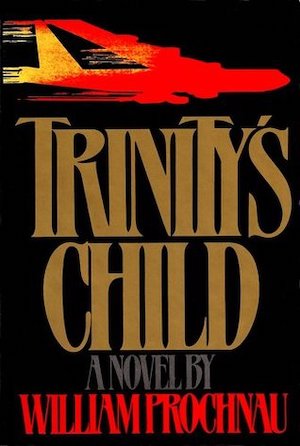
Rather than continue to fund expensive defenses against the American nuclear arsenal, the Politburo resolves to save money by launching a first strike against United States’ military assets. The Soviet premier believes that this would be tantamount to national suicide as it would invite a full-scale response; he resists, first by delaying the attack, then by launching a much reduced attack, on a scale that would kill perhaps nine million Americans. This is accompanied by a telegram to the US President explaining the premier’s goals, delivered minutes before an incoming missile is slated to strike somewhere near Washington, DC.
US bomber forces caught on the ground will be destroyed, as will US Trident bases. Some ICBM sites are targeted. The point is not to reduce the US to helplessness, but to make the precariousness of the world situation clear at what is considered an acceptable cost of only fifteen to twenty million lives worldwide.
It’s a plan as bold as it is deranged. The American president can order a proportionate response, but once the nuclear warheads start detonating, there is no way to ensure that the exchange will not escalate. After the president’s apparent death, command devolves to the Secretary of the Interior, the senior-most surviving official in the ladder of succession. He is a man to whom command should not be entrusted. A full-scale nuclear exchange seems inevitable.
Polar Bear One, one of the few bombers to escape the Soviet attack, is heading over the pole. Filled with nuclear weapons, the plane is a potent weapon of war. It is the last place to which one might look for a hope of stopping the escalation. Nevertheless, the plane’s crew may be the last chance of avoiding apocalypse.
***
No doubt you have your own favourites not mentioned above (or here. Or here. Or here. What can I say? I was a Cold War kid and this is a topic close to my heart). Please feel free to mention them below.
In the words of Wikipedia editor TexasAndroid, prolific book reviewer and perennial Darwin Award nominee James Davis Nicoll is of “questionable notability.” His work has appeared in Publishers Weekly and Romantic Times as well as on his own websites, James Nicoll Reviews and the Aurora finalist Young People Read Old SFF (where he is assisted by editor Karen Lofstrom and web person Adrienne L. Travis). He is a four-time finalist for the Best Fan Writer Hugo Award and is surprisingly flammable.










